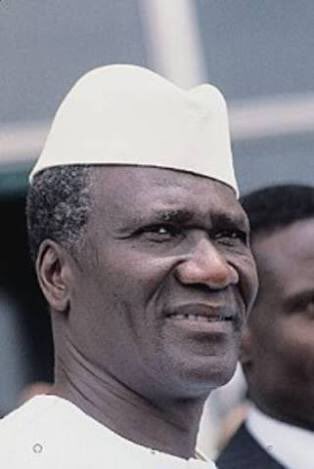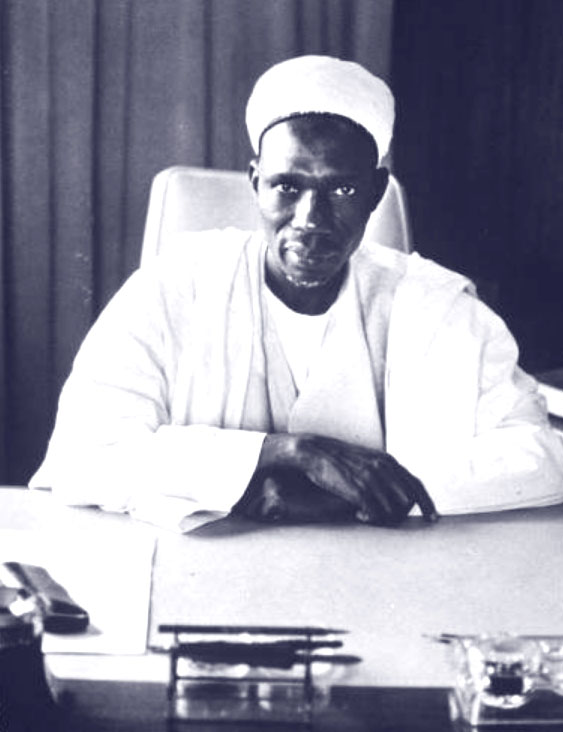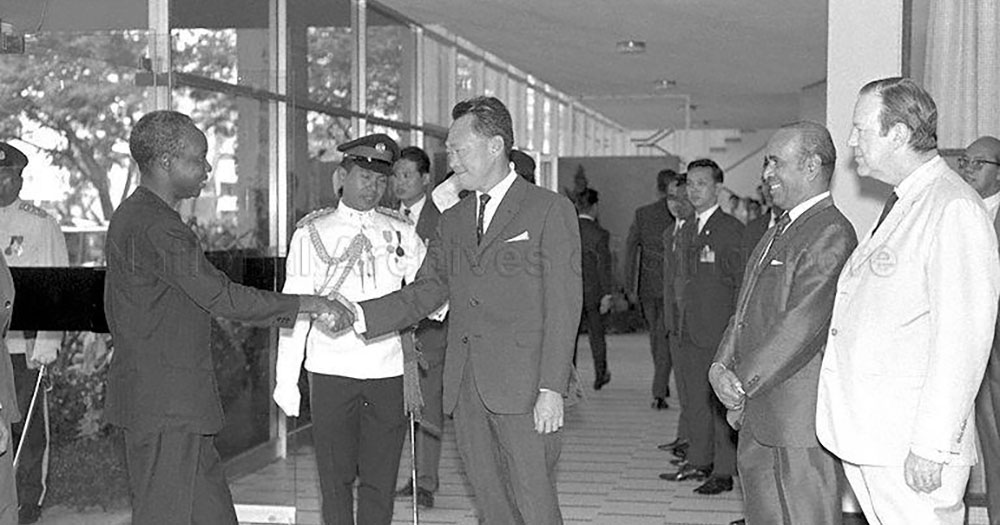In the first quarter of 1964, the late Lee Kuan Yew made a trip to Africa.
Sought support
He met the leaders of 17 African countries in order to gain their support for the newly-created Federation of Malaysia.
It was a trip aimed at countering the global propaganda campaign driven by Indonesian President Sukarno's Konfrontasi policy.
According to the first volume of Lee's memoirs, Sukarno's propaganda involved painting the late Malaysian Prime Minister Tunku Abdul Rahman as a "mild moderate man of the West" who was a "British stooge".
For the Africans, such propaganda by the Indonesians was particularly effective as a result of colonialism's legacy in Africa.
Explaining positions
Sukarno's organisation of the Bandung Conference in 1955, where newly-independent Asian and African countries had come together to declare their refusal in picking sides in the Cold War, also gave credence to his claim about the Tunku.
For Lee, the African trip was necessary to explain Malaysia's position and garner sympathy from the Africans in the United Nations.
Apart from Egypt, the trip would mark Lee's first extensive contact with Africa and it left multiple impressions on him.
Lee learnt about nation-building after he met with the various leaders and saw for himself the state of their countries which he travelled through them.
A destiny of poverty for countries that took a socialist anti-colonial stance
This was Lee's assessment of countries such as Guinea, Tanzania and Ghana.
For Guinean President Sekou Toure with his strong anti-French stance and Tanzanian Prime Minister Julius Nyerere with his humanist leanings, socialism provided a strong foundation for their countries to stand up to their former European colonisers politically and economically.
But for Lee, it was a path that would subject their countries to "unnecessary poverty".
Guinea
In the case of Guinea, Lee was convinced that Toure's decision to follow the Soviet style of socialism would devastate the country economically, even if the French had not left the country without first pulling out the civil service, government equipment, telephones and toilets.
 Source: West African History Twitter
Source: West African History Twitter
After all, in 1958, when Toure organised a referendum to reject close ties with France, he famously stated, "Guinea prefers poverty in freedom to riches in slavery".
Toure's rule would come to reflect these words.
By the end of his rule in 1984 after 26 years in power, Guinea remained one of the world's poorest nations, with an annual per capita income of only US$140.
Life expectancy is at 41 years and only 10 percent of the population was literate.
This was despite Guinea having the world's largest bauxite deposits, along with diamonds, gold and iron ore.
Tanzania
For Tanzania, Nyerere fared somewhat better.
Nyerere succeeded in raising the literacy rate of Tanzania to 83 percent, which impressed Western countries enough to turn Tanzania into one of the 10 largest recipients of foreign aid per capita.
[caption id="" align="alignnone" width="525"] Source: Pan-African Renaissance Facebook[/caption]
Source: Pan-African Renaissance Facebook[/caption]
However, his socialist policy of "Ujamma", which involved collective farming and nationalisations of land, property, industries, businesses and even schools, turned out to be a disaster.
Tanzanians complained that it led them to being forced out of their homes into planned villages, which stultified Tanzania's economy, shrank agricultural production, encouraged corruption and wasted the foreign aid.
When Nyerere resigned from his party position in 1985, Tanzanians were surviving on a per-capita income of US$200 per year.
Even so, Lee took a personal liking to Nyerere "for his simplicity of dress, manner and way of life" during their meeting and subsequently tried suggesting to Nyerere for a while to take a different approach in developing his country.
Ghana
Ghana was a country that Lee thought showed promise at first given that it was the first African country to gain its independence on March 5, 1957, with the added advantage of having cocoa plantations and gold mines.
His visit in 1964 started a process of disillusionment.
President Kwame Nkrumah, he noted, was "a great pan-African" who "had his anti-colonial credentials to keep up".
Nkrumah told Lee that if he had not showed up in Ghana, they would not have supported Malaysia's position: "... you would have lost by default, your fault."
[caption id="" align="alignnone" width="483"] Source: Kwame Nkrumah Facebook[/caption]
Source: Kwame Nkrumah Facebook[/caption]
Additionally, Nkrumah had adopted socialism for Ghana's economic development. Some 50 state-run companies were launched, schools and universities were built, and liberation movements in African states that were still under European rule were backed.
A massive hydroelectric dam known as the High Volta was also constructed. It was a project built by the Italians and funded by the World Bank, US and British governments.
When Lee went to see this structure after meeting Nkrumah, he concluded that Ghana and its people would "become paupers".
It was a conclusion that would be confirmed in only two years.
By 1966, most of the state-run companies lost money under poor management and strikes were commonplace as the cost of living went up, while the price of cocoa went down.
An army coup was launched while Nkrumah was in Beijing. Upon his return, he was placed under protective custody.
His overthrow was celebrated by many Ghanaians.
Unsurprisingly, Lee came to be impressed with what he called the "realism" of African countries that decided not to adopt an anti-colonial, pro-communist or socialist stance.
Prosperity for countries that modelled themselves after their colonisers
Unfortunately, countries that set up their government after their colonisers proved to be inadequate in handling social divisions.
Nigeria
Nigerian Prime Minister Alhaji Sir Abubakar Tafawa Balewa was one of the few leaders who left Lee with a strong positive impression about the country's future.
 Source: Pan-African Renaissance Facebook
Source: Pan-African Renaissance Facebook
Much of this stemmed from the guard of honour welcome ceremony and infrastructure that greeted Lee when he arrived in Lagos. They were all done in the manner of the British.
It was an impression that would not last.
Most of Nigeria's political power had been handed over by the British to the northern Nigerian Muslims, which left the Christian south feeling excluded and marginalised.
On his next visit to Lagos two years later in 1966 for the first Commonwealth meeting, Lee found that the city looked like it was "under siege" with multiple police barricades.
Shortly after the meeting's conclusion, Prime Minister Abubakar was assassinated in a coup led by Nigerian army majors on the basis of getting rid "of rotten and corrupt minister and political parties".
All of the army majors had been trained in the UK and were from the Christian south.
It was the first of many more coups to come for the country.
Ivory Coast
Another leader that Lee took a great liking to was Ivory Coast President Félix Houphouet-Boigny.
Houphouet-Boigny had his French style of administration once said that "Africans leaders who... became anti-colonial and pro-communist or socialist would suffer".
[caption id="" align="alignnone" width="267"] Source: Houphouet Boigny félix Facebook[/caption]
Source: Houphouet Boigny félix Facebook[/caption]
Prior to the Ivorian civil wars of the 21st century, Lee's positivity about Ivory Coast was not misplaced.
By 1979, the country was considered to have the best infrastructure and the most equitable distribution of personal annual income -- about US$1,100 per capita.
It was also averaging a 7 percent economic growth per year up to that point and dubbed "the Ivorian miracle" with The Washington Post calling its prosperity "unique in Black Africa".
Unfortunately, the miracle would not last.
The country's economic success attracted many migrants from poorer neighbours who began settling in the country, so much so that eventually, over 25 percent of the Ivorian population was foreign.
Houphouet-Boigny's successor, Henri Konan Bedie, instituted a law that allowed only Ivorians whose parents were both from the Ivory Coast to run for office.
The law created resentment among Ivorians who had foreign-born parents when his main opponent, Alassane Outtara, was disqualified on the grounds that his father was from neighbouring Burkina Faso.
Compounded by France's continued support of the Ivorian government, the resentment eventually boiled over into civil war.
Horrible experiences in the two African countries that were never colonised
Then there were Liberia and Ethiopia.
Suffice to say, both of them turned out to be anything but Wakanda.
Liberia
Liberia was perhaps the most extreme example of a pro-Western African country that was in shambles.
Founded in 1847 by freed African-American slaves with support from the American Colonisation Society and American government, Liberia was established with American-style institutions and administrations.
Evidently, this did not translate into success for the country.
The American-style guard of honour that greeted Lee during his arrival at the Liberian capital, Monrovia, was "most unmilitary and anything but smart".
The 18-gun salute sounded like "damp squibs". En route to meeting the pro-American Liberian President, William Tubman, motorcycles in the convoy skidded off the road into the ditches.
[caption id="" align="alignnone" width="413"] Source: William Tubman Wikipedia[/caption]
Source: William Tubman Wikipedia[/caption]
When the Liberian secretary of state and military commanders travelling with Lee showed no reaction to the accidents, Lee decided not to ask after the drivers.
Monrovia itself was a stark contrast between Tubman's presidential palace and the slums around it.
To top it off, the guesthouse in Monrovia had no running water except "a washbasin full of water with rusty sediment at the bottom".
Completing the effect was a pamphlet in Lee's room which hailed President Tubman as "the star of Africa, the saviour of his country".
Liberia marked the only time where an African country with strong Western leanings left a bad taste with Lee -- for him, the entire country was a "scream".
The country would eventually see two civil wars from 1989-2003 that crippled the country severely.
By 2016, the gross domestic product per capita was US$455 and the country is currently ranked 177 out of 189 countries by the UN human development index.
Ethiopia
Presenting a historical contrast of sorts but no less terrible experience was Ethiopia.
Being the sole native African state to escape colonisation after successfully fighting off an attempt by the Italians in 1896 meant that Ethiopian Emperor Haile Selassie's rule "was not one of the revolutionary regimes of Africa".
[caption id="" align="alignnone" width="463"] Source: Haile Selassie, Emperor of Ethiopia Facebook[/caption]
Source: Haile Selassie, Emperor of Ethiopia Facebook[/caption]
Instead, Lee found himself "shocked by the deference and cowed demeanour of the people on the streets as my car drove by with flags fluttering...[as] they knew their humble place at the bottom of the ladder" in the presence of the flags which represented the emperor's authority.
The Ethiopian people also looked "shabby and poor" against "the sometimes handsome buildings around them".
Selassie's support of Malaysia's position failed to warm Lee towards what he saw "an antiquated feudal system that kept the peasants down and confined wealth to the nobility". He "did not feel sanguine about the future of the country".
Some 10 years later, Selassie would be overthrown by a group of Marxists known as the Derg, who would go on to rule Ethiopia with such brutality and incompetence until 1991, that the country eventually became synonymous with the word "famine".
[related_story]
How not to run an independent country
Eventually, Lee came to see Africa in general as a lesson on decolonisation.
The socialism that so many leaders expounded, along with what he saw as the incompetence of their governments and their exclusion of minority tribes from political power, did not leave him optimistic for Africa's future.
It did not help that few of the African leaders were modest in their lifestyles either. At subsequent Commonwealth meetings, Lee found:
"The fashion of the time was for leaders of the bigger Third World countries to travel in their own aircraft... Those African presidents whose countries were then better off like, Kenya and Nigeria, also had special aircraft. I wondered why they did not set out to impress the world that they were poor and in dire need of assistance."
Lee concluded that for the Africans, "tribal loyalties were stronger than their sense of nationhood" and that their societies, "formerly held together by colonial power", would splinter "with appalling consequences" under poor governance.
Top image from National Archives of Singapore
If you like what you read, follow us on Facebook, Instagram, Twitter and Telegram to get the latest updates.
